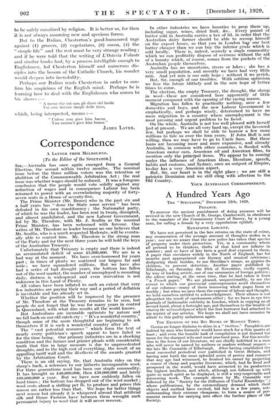A Hundred Years Ago
THE " SPECTATOR," DECEMBER 12th, 1829.
PENANCE.
To-morrow the ancient punishment of doing penance will be revived in the new Church of St. George, Camberwell, in obedience to the mandate of the Commissory Court of Surrey, by a young man, for calling a female by a very opprobrious epithet.
NEWSPAPER LARCENY.
We have not perceived in the late returns on the state of crime, any enumeration of the average amount of thoughts stolen in a year ; nor are we aware that the new police has taken that species of property under their protection. Yet, in a community where all pretend to be thinkers, thefts of that kind are infinite in number ; and we have of late been a good deal exposed to them. A paper that circulates widely in the North of England, has for months past appropriated our literary and musical criticisms disfiguring them besides, to use Sheridan's image, as gypsies do children, to prevent detection. Another paper published in Edinburgh, on Saturday the 28th of November, coolly copied, by way of leading article, one of our summaries of foreign politics ; the editor stating, at the same time, that he had taken it from " a French paper." We are pleased, unquestionably, to see the extent to which our provincial contemporaries avail themselves of our columns—many of them borrowing whole pages from us weekly ; but when we save them the expense of labour and thought, we hold ourselves entitled to acknowledgment. Their silence is not altogether the result of carelessness either ; for we have in eye two journals of fashionable celebrity in London, which in copying us at second-hand, about a fortnight ago, put themselves to the trouble of eirwing the acknowledgment which the first borrower had attached to his reprint of our articles. We hope we shall not have occasion to allude to this paltry unfairness again.
THE EXPENSE OF THE BIG BOOKS OF MODERN TIMES.
Genius no longer disdains to shine in a " twelves." Pamphlets are indited by men who formerly would have stuck for a thin quarto at least ; and even the humble task of compilation is not deemed too mean for the sharpest wits and most practised pens. For this revolu- tion in the form of our literature, we are chiefly indebted to a man who will never be named by authors or readers without respect— the late Mr. Constable of Edinburgh. After having established the most successful periodical ever published in Great Britain, and having sent forth the most splendid series of poetry and romance that any age had witnessed, he finished his career by projecting a course of cheap and popular literature, which, had he lived and prospered in the world, would have attracted to its production the highest intellects, and which, although not followed up with quite so much spirit as he displayed, is still a very respectable and interesting work. The example shown by Mr. Constable was followed by the " Society for the Diffusion of Useful Knowledge" ; whose publications, by the extraordinary demand which their objects and method have excited, bid fair in a few years, not- withstanding their extreme cheapness, to form a source of per- manent revenue for carrying into effect the further plans of the Society.












































 Previous page
Previous page